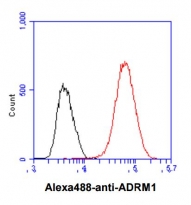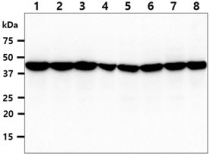ARG56975
anti-ADRM1 antibody [34C2]
anti-ADRM1 antibody [34C2] for Flow cytometry,Western blot and Human
Overview
| Product Description | Mouse Monoclonal antibody [34C2] recognizes ADRM1 |
|---|---|
| Tested Reactivity | Hu |
| Tested Application | FACS, WB |
| Host | Mouse |
| Clonality | Monoclonal |
| Clone | 34C2 |
| Isotype | IgG2b, kappa |
| Target Name | ADRM1 |
| Antigen Species | Human |
| Immunogen | Recombinant fragment around aa. 1-407 of Human ADRM1. |
| Conjugation | Un-conjugated |
| Alternate Names | 110 kDa cell membrane glycoprotein; hRpn13; ARM1; ARM-1; Proteasomal ubiquitin receptor ADRM1; Gp110; Adhesion-regulating molecule 1; GP110; Rpn13 homolog; Proteasome regulatory particle non-ATPase 13 |
Application Instructions
| Application Suggestion |
|
||||||
|---|---|---|---|---|---|---|---|
| Application Note | * The dilutions indicate recommended starting dilutions and the optimal dilutions or concentrations should be determined by the scientist. |
Properties
| Form | Liquid |
|---|---|
| Purification | Purification with Protein G. |
| Buffer | PBS (pH 7.4), 0.02% Sodium azide and 10% Glycerol. |
| Preservative | 0.02% Sodium azide |
| Stabilizer | 10% Glycerol |
| Concentration | 1 mg/ml |
| Storage Instruction | For continuous use, store undiluted antibody at 2-8°C for up to a week. For long-term storage, aliquot and store at -20°C. Storage in frost free freezers is not recommended. Avoid repeated freeze/thaw cycles. Suggest spin the vial prior to opening. The antibody solution should be gently mixed before use. |
| Note | For laboratory research only, not for drug, diagnostic or other use. |
Bioinformation
| Database Links |
Swiss-port # Q16186 Human Proteasomal ubiquitin receptor ADRM1 |
|---|---|
| Gene Symbol | ADRM1 |
| Gene Full Name | adhesion regulating molecule 1 |
| Background | This gene encodes a member of the adhesion regulating molecule 1 protein family. The encoded protein is a component of the proteasome where it acts as a ubiquitin receptor and recruits the deubiquitinating enzyme, ubiquitin carboxyl-terminal hydrolase L5. Increased levels of the encoded protein are associated with increased cell adhesion, which is likely an indirect effect of this intracellular protein. Dysregulation of this gene has been implicated in carcinogenesis. Alternative splicing results in multiple transcript variants. [provided by RefSeq, Jul 2013] |
| Function | Functions as a proteasomal ubiquitin receptor. Recruits the deubiquitinating enzyme UCHL5 at the 26S proteasome and promotes its activity. [UniProt] |
| Calculated MW | 42 kDa |
Images (2) Click the Picture to Zoom In
-
ARG56975 anti-ADRM1 antibody [34C2] FACS image
Flow Cytometry: MCF7 cell line stained with ARG56975 anti-ADRM1 antibody [34C2] at 2-5 µg for 1x10^6 cells (red line). Secondary antibody: Goat anti-Mouse IgG Alexa fluor 488 conjugate. Isotype control antibody was Mouse IgG (black line).
-
ARG56975 anti-ADRM1 antibody [34C2] WB image
Western blot: 40 µg of 1) MCF7 cell lysate, 2) HeLa cell lysate, 3) K562 cell lysate, 4) PC3 cell lysate, 5) 293T cell lysate, 6) HepG2 cell lysate, 7) Jurkat cell lysate, 8) U87MG cell lysate stained with ARG56975 anti-ADRM1 antibody [34C2] at 1:1000. .







